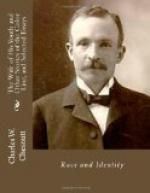The face of the young man in the back of the room expressed relief and badly concealed satisfaction. The prisoner fell back upon the seat from which he had half risen in his anxiety, and his dark face assumed an ashen hue. What he thought could only be surmised. Perhaps, knowing his innocence, he had not believed conviction possible; perhaps, conscious of guilt, he dreaded the punishment, the extent of which was optional with the judge, within very wide limits. Only one other person present knew whether or not he was guilty, and that other had slunk furtively from the court room.
Some of the spectators wondered why there should be so much ado about convicting a negro of stealing a buggy-whip. They had forgotten their own interest of the moment before. They did not realize out of what trifles grow the tragedies of life.
It was four o’clock in the afternoon, the hour for adjournment, when the verdict was returned. The judge nodded to the bailiff.
“Oyez, oyez! this court is now adjourned until ten o’clock to-morrow morning,” cried the bailiff in a singsong voice. The judge left the bench, the jury filed out of the box, and a buzz of conversation filled the court room.
“Brace up, Ben, brace up, my boy,” said the defendant’s lawyer, half apologetically. “I did what I could for you, but you can never tell what a jury will do. You won’t be sentenced till to-morrow morning. In the meantime I ’ll speak to the judge and try to get him to be easy with you. He may let you off with a light fine.”
The negro pulled himself together, and by an effort listened.
“Thanky, Majah,” was all he said. He seemed to be thinking of something far away.
He barely spoke to his wife when she frantically threw herself on him, and clung to his neck, as he passed through the side room on his way to jail. He kissed his children mechanically, and did not reply to the soothing remarks made by the jailer.
III
There was a good deal of excitement in town the next morning. Two white men stood by the post office talking.
“Did yer hear the news?”
“No, what wuz it?”
“Ben Davis tried ter break jail las’ night.”
“You don’t say so! What a fool! He ain’t be’n sentenced yit.”
“Well, now,” said the other, “I ‘ve knowed Ben a long time, an’ he wuz a right good nigger. I kinder found it hard ter b’lieve he did steal that whip. But what ‘s a man’s feelin’s ag’in’ the proof?”
They spoke on awhile, using the past tense as if they were speaking of a dead man.
“Ef I know Jedge Hart, Ben ‘ll wish he had slep’ las’ night, ’stidder tryin’ ter break out’n jail.”
At ten o’clock the prisoner was brought into court. He walked with shambling gait, bent at the shoulders, hopelessly, with downcast eyes, and took his seat with several other prisoners who had been brought in for sentence. His wife, accompanied by the children, waited behind him, and a number of his friends were gathered in the court room.




